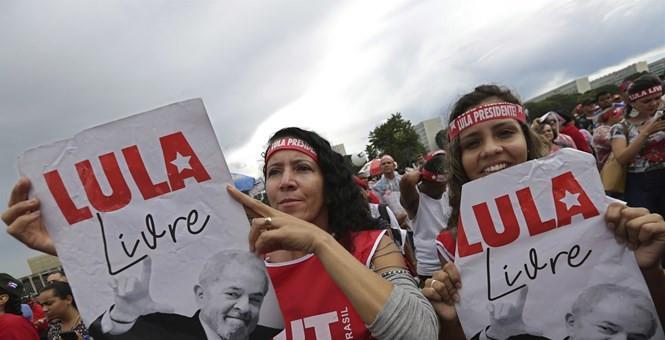
A sharply divided top court voted early on April 5 to reject an attempt by former Brazilian President Luiz Inacio da Silva to stay out of jail while he appeals a corruption conviction, delivering a hard blow to the front-running candidate in this year’s presidential election in Latin America’s largest nation.
After nearly 11 hours of often heated debate, the Supreme Federal Tribunal voted 6-5 to deny da Silva’s request to stave off a 12-year prison sentence while he fights a conviction that he has always argued was nothing more than a ploy to keep him off of the October ballot.
Despite the conviction and several other corruption charges against him, da Silva leads all preference polls for the election.
The decision means that da Silva will likely be jailed soon, though probably not until at least next week thanks to various technicalities.
Chief Justice Carmen Lucia, who was sharply criticized during the session by various colleagues, cast the deciding vote after the court was tied at 5 to 5.
“The constitution secures individual rights, which are fundamental to democracy, but it also assures the exercise of criminal law,” she said.
The debate at the Supreme Federal Tribunal underscored how fraught the matter is at a time of high tension and angst in Brazil.
Justice Gilmar Mendes, traditionally a critic of da Silva, voted in favor of da Silva’s petition to stay out of jail, challenging his colleagues to buck pressure from society.
“If a court bows [to pressure], it might as well not exist,” said Mendes.
Justice Luis Roberto Barroso argued that the integrity of the justice system was at stake.
“A penal system that doesn’t work with minimal effectiveness leads to an instinct for taking justice into one’s own hands,” Barroso said in voting against da Silva.
Justice Rosa Weber, who legal analysts had said could be key because there was much doubt about her position on the matter, voted against da Silva.
In one of several brisk exchanges, after Weber’s vote, justice Marco Aurelio Mello accused Lucia of plotting against da Silva’s case. Mello said limiting the vote just to the habeas corpus petition and not the larger question of when a convicted person should be forced to begin serving a sentence helped sway Weber’s vote.
“I want this to be registered in the court’s records,” Mello told Lucia, who responded by saying “yes” to the request.
The session reflected the debate happening across Brazil as millions tuned into the televised session. When the decision was delivered, fireworks and yells could be heard and seen in Rio de Janeiro and Sao Paulo, two of the nation’s most important cities.